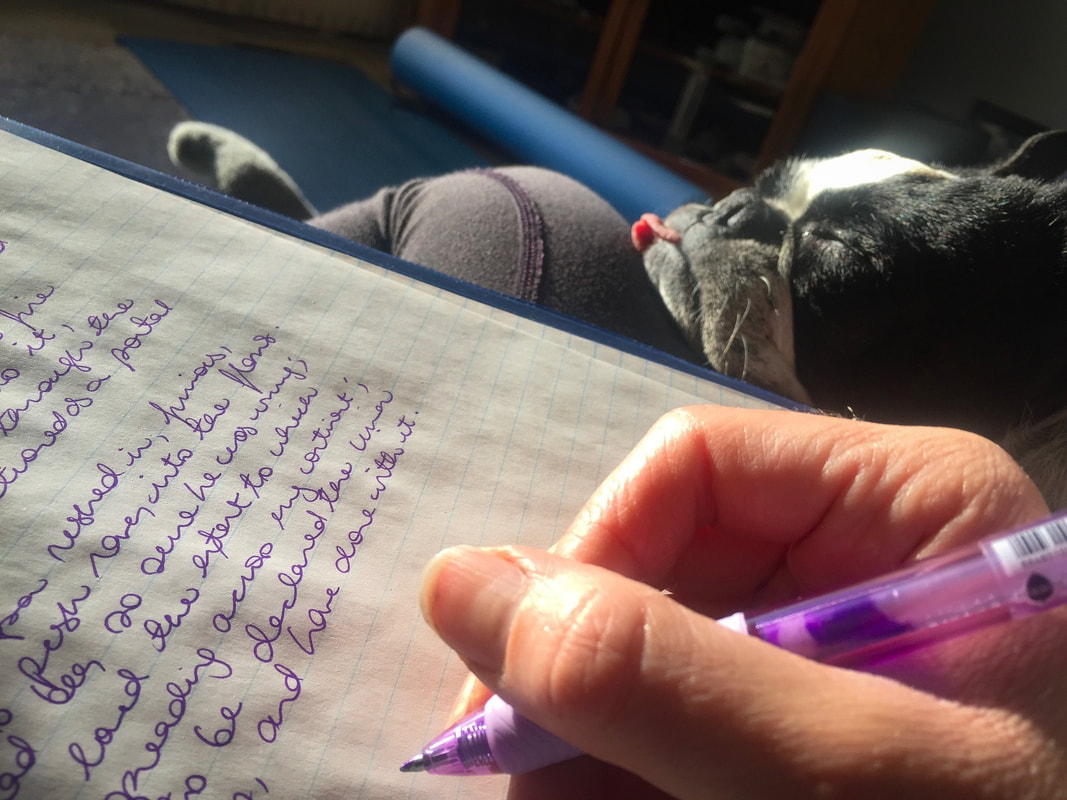|
One of the biggest challenges writers face (aside from Writer's Block) is “finishing their story.” But what does that actually mean? You know the feeling of telling a few people that you’re working on a book and then every time you see them, they ask, “So how’s your book coming along?" And you usually respond something like this, “Oh, pretty good, I’m plugging right along.” Or maybe more like this, “Good, but SLOW. I’ll get there eventually.” Or if you’re lucky, something like this, “Actually, I just finished it!” But what does finishing your story actually mean? There are three definitions of finishing your story. Let’s dive in. Finish Your Story Definition #1: Finish the First DraftMore often than not, this is the definition most people associate with finishing a writing project. And rightly so, it’s a major accomplishment! So first off, congratulations! Yes, be sure to celebrate. But finishing the first draft of a writing project is just that – the FIRST draft. You’ll still need to revise it, edit it, submit it, edit it some more, publish it, and then finally promote it.
When I was around 9 years old, my mom took me to a hair salon to get my hair cut. She held my hand as we walked toward the front door. I had never been to a salon or a barber shop before. The door jingled with a bell as it closed behind us. We sat in the worn-out red seats with scuffed metal frames and waited. I watched the hairdresser finish up with an old lady, whose hair was big and curly, and more blue than white. It made me think of Grandma. The hairdresser used a hairspray that made me choke and gag. I waved my hand up and down in front of my face to waft it away from me.
It was my turn to climb into the big black cushioned chair. The hairdresser put a booster seat under my butt to make me taller in the chair. I didn’t smile. She draped a heavy dark grey cape around me. I listened as she chatted with my mom and used a green bottle to spray water on my dark hair. “I bet you get lots of compliments on your beautiful black hair.” I barely nodded. But I wanted to say, “It’s not black! It’s dark-dark brown!” which is what I told everyone. She used a large comb to brush through my hair. Every time she found a small tangle, I winced. “Your hair is so long and thick. How short do you want it?” I continued staring blankly at myself in the mirror. My mom chuckled. “Just a trim. I think she’s a little nervous.” Then she turned to me and said, “Lighten up, honey. You look like a ghost. Smile!” Ever had a moment like that when you were looking forward to something, even if it was the unknown, and in the middle of it, you just froze? Writer’s Block is a lot like staring at yourself in the mirror with a blank face - feeling like a nervous ghost. When I was a kid, I had a lot of dreams. Mostly about what I wanted to do when I grew up. I dreamed of being a scientist when I got a microscope for Christmas. I dreamed of being a singer when I did my chores (singing all the while). I dreamed of being a figure ice skater even though I had never been ice skating (it was beautiful and looked fun). I played school (teacher) and office (secretary) and family (mommy). Between every new dream, I always came back to my #1 dream: to be a writer!
At some point, I dreamed of running a marathon. I have now run two! (Gonna run an ultra when I turn 50!) I now have two published books. I also teach other writers how to write novels. And while I’m basically living my dreams, at some point I realized I wouldn’t have reached any of them if I didn’t know how to read. My new dream is a big one that I’ll never be able to reach all by myself: end world illiteracy. The U.S. statistics alone are utterly shocking. The number one challenge writers face is learning the craft. The number two challenge is how to revise and edit your novel, but revising doesn’t have to be hard. If you’ve written the first draft, spend an entire week celebrating. That’s a huge accomplishment! You just overcame the third biggest writing challenge: finishing your first draft.
But don’t start submitting your work just yet, you need to revise your story so it shines and editors will want to publish it. Let’s talk about three ways you can revise your novel. Start Revisions by Looking at Plot Whenever I’m helping other writers revise their novels, we always start with plot. Whether you’re writing your first draft, or you’re starting the revision process, knowing your five main plot points will help you create a stronger plot and a better story. Revision can - in a sense - happen before you ever write your first word. Which is why creating a plot outline before you write helps cut down on your revision timeline. If your plot points aren’t identified correctly, your pacing will be off. Being able to know which plot points are most important and where to properly place them will help you avoid a slow start and a saggy middle. For example, the most important scene for the middle of your novel should show up in the middle. But if the scene you have that shows up in the middle is your two characters leaving the ranch, when it really needs to be when they finally reach the canyon, then you’ll have to revise – or rearrange – your plot points so that your character motivations, pacing, and storyline flows better and makes more sense. So start all your revisions by looking at your novel’s plot points first. And revise accordingly. Not all critiques are the same. Sure, it’s one person’s feedback – their opinions, thoughts, and suggestions, ideas to make your writing better and your story stronger. But what if you disagree? What if you don’t know how to take their advice? Or if you even should? How do you implement feedback from lots of people? Getting a manuscript critique is an essential part of being a writer. Good critique partners for a writer is like a running coach for a runner. In a word? Transformational!
Things to Consider When Getting a Critique I’ve shared how to give a good critique and how to overcome the fear of getting a critique, so now let’s talk about once you have a critique, how do you take the feedback and put it to good use? There are two major things to consider.
While the best critiques will come from other writers who write in the same genre as you, the same is true of those who have a similar level of writing experience (or better) as you. I have given and received hundreds of critiques and while all levels of experience are valued and provide fresh perspectives, the times I have grown the most are when the people giving me critiques have had more experience or were further along the writing journey than I was. The Purpose of a Manuscript Critique Often, writers seek feedback on their work to see how good their writing is. But the real reason you should get a critique is to learn how to become better. That only happens when people point out your faults and weaknesses. So if you want a good critique, be prepared to hear some harsh (not hateful) feedback in the process. More on that later. For now, let’s talk about the real purpose of getting feedback on your manuscripts. How does it help you become a better writer?
Secondly, manuscript critiques should provide encouragement. This doesn’t mean that every word should be a glowing review of your language prowess. On the contrary, it means that they mix positive and negative feedback and cheer you on to keep going. Their words encourage you to work through your story’s problems and work to make it better. A critique should never berate you, belittle you, put you down, or say hateful things to you. Negative feedback can also lift you up when delivered with a little bit of encouragement Learning how to write fiction is different from learning how to write academically such as essays, research papers, or book reports. Fiction requires superb storytelling skills. There are three main ways to learn the craft of writing fiction: studying the craft from experts, getting your work critiqued, and attending writing conferences and retreats.
What is the Writing Craft? Just what does it mean to study the craft of writing anyway? There are many ways you could answer this question. One dictionary definition goes like this: Writing Craft - n. “the artistic skill or technique with which an author puts together narrative and other elements in order to convey meaning.” Let’s get more specific. The writing craft consists of basic elements to help make your story readable and have meaning. It consists of such strategies as characterization, conflict, plot, dialogue, tension, backstory, theme, pacing, tone, voice, setting, point of view, and more. These are the narrative storytelling elements that make your writing flow and make sense to a reader. One way to learn the writing craft is to jump in and figure it out. Just write. Keep practicing. You’ll get there eventually. But there are better ways. Study the Craft of Writing From ExpertsExperts in the literary industry include published authors, editors, and book coaches. They can teach us a lot about how to write fiction. All we have to do is consume their information, usually in the form of books, workshops, or courses. So when you have an opportunity to buy a book you think will help you, or attend a workshop or take a course from a writer you admire, do it! Other tips to become a better fiction writer and practice the craft include the following:
If you’re reading, writing, and studying about writing, you will continue to get better. And when it comes to your writing craft, that’s always the goal. Since 2010, I have been blogging over at www.christiewrightwild.blogspot.com. It started out as a personal journal for my writing. It has morphed several times over the years focusing on different things such as picture books, websites for authors, and of course my own publication journey.
It's time for Writers Who Run to get its own blog. So here we are! Every Monday, a new blog post will be published. Topics will always be focused on our four pillars for content. And of course, when I'm talking about productivity or mindset, it usually also applies to both writing and running. Which pillar are you most excited to learn more about? Let us know over on the Writers Who Run Facebook page. |
Christie Wright Wild
Founder, Writers Who Run Creator, Plot Like a Novelist Books
My Dandelion Wish Journal: A 5-Year Guided Nature Journal
101 Fun Creative Writing Exercises: Become a Better Writer in 14 Minutes a Day Categories
All
Archives
October 2023
|









 RSS Feed
RSS Feed